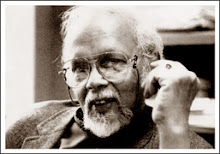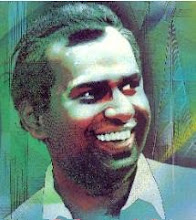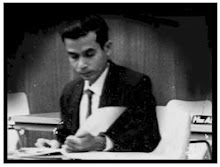Date: 25/07/2010
Source: Sunday Times
Desperate times called for desperate measures. The lawyer, all dressed for an interview walked into the petrol station and spoke to the manager. “He asked me, ‘when can you start as a petrol pump attendant?’ I said, ‘immediately.’ I took off my suit and went to work.”
When Namel Weeramuni took a trip to London at the age of 39, he was quite unprepared to find that in the interim he had lost his job as a lawyer and assistant draughtsman back in Sri Lanka. His trip, intended as a research stint for the government also included a brief foray into the U.S where he had been invited to serve as an observer in the Congress as well as in the Senate. When he was inexplicably fired, he decided to pursue his fortunes in the U.K.




Mr. Weeramuni had discovered that though he could continue his work as a solicitor in London, he would first have to undergo a compulsory period as a clerk in a law office. He found a position, but the only problem was it paid five pounds – a pittance even in those times. Mr. Weeramuni knew he would have to make his living elsewhere – he worked part time as a waiter and a bartender, and even as a petrol pump attendant. “I’m not ashamed to say it, there was dignity of labour in that country,” he says, looking back. A highlight: “I used to go and record programmes for the BBC – they had a Sinhala service. They paid 13 pounds for five minutes. That was great.”
Christmas at the petrol station was a time of abundance. Lavish tips from customers meant that Mr. Weeramuni (and the few other Sri Lankan’s he had found jobs for at the petrol station) went home with over 60 pounds each – a small fortune. When he handed over the money to his beloved wife Manel, she found an empty box, put it in and said – “here, this is for your little theatre.”
Since 1962, Mr. Weeramuni had been dreaming of his own “punchi” theatre. Then a young law student and passionate thespian, he had made his debut in 1959 with ‘Raththaran’. Now he spent a significant portion of his week rehearsing for new plays in odd places in the company of fellow actors like Henry Jayasena and Sugathapala Silva. He longed for a space to rehearse in – “even a cadjan hut would do,” he says. His wife knew of his ambition to found just such an open space for artists in Sri Lanka. Though they were stretched thin, she wanted to help him realise his dream.
Over the course of the next three decades, Mr. Weeramuni received his licence to practise and founded his own firm in a humble 10 by 10 room. He expanded the consultancy, until he had over 40 people working under him. Namel de Silva and Co. became a very lucrative practice. “I had a very good clientele, and I worked very hard, sometimes, 15 – 16 hours a day,” he says. Throughout this period, he continued to stage a play a year, either in Sinhala or in English. After over 29 years abroad, he and Manel returned to Sri Lanka in 2003 and built the Punchi Theatre.
Since then, Mr. We
 eramuni has written, acted in and produced several noteworthy plays, including ‘Hataraweni Tattuva’, ‘Virupi Rupa’, ‘Maadyavediyekuge Adhipatha,’ ‘Vanasakkarayo’, ‘Kasi Raten’ and ‘Nattukkari’. He is most proud of ‘Madyavediyakuge Asipatha’ (The sword of a journalist) – a hard hitting play that he hopes to revive soon.
eramuni has written, acted in and produced several noteworthy plays, including ‘Hataraweni Tattuva’, ‘Virupi Rupa’, ‘Maadyavediyekuge Adhipatha,’ ‘Vanasakkarayo’, ‘Kasi Raten’ and ‘Nattukkari’. He is most proud of ‘Madyavediyakuge Asipatha’ (The sword of a journalist) – a hard hitting play that he hopes to revive soon.This year, with the publication of ‘Damsel of Death’, Mr. Weeramuni also added ‘poet’ to his resume. The collection features nearly fifty poems – many of which grapple with intensely personal concerns. A painting by one of his four grandchildren graces the cover of the book.
This year, he and his wife Manel will celebrate 47 years of marriage and the Punchi Theatre will have been in existence for eight. “It’s his dream and my nightmare,” she says, laughing, clearly as determined as he is to keep it going.
This week, Mr. Weeramuni recommends five great Sri Lankan experiences. n What to eat where: I like to go to any of the restaurants at the Cinnamon Grand. My favourite is Tao - I do like the way they make fish, seer fish in particular. We also go to Lagoon. The other place I like is Agra for their North Indian cuisine. I like the tastes of their masala and the roti.
n Where to visit: I have travelled all around the island when I was a student, in ’57, on a push bike. We were treated very well in Jaffna by our Tamil friends. I’d also suggest a visit to Galle. Now, I would prefer to go to Kandy and to Nuwara Eliya because of the cold climate. But of course, as a city, I prefer to visit the greatest – Anuradhapura and Sigiriya. They represent our culture, our history. Without history I believe we cannot live in the present nor predict the future.
n What to read: I always like to read serious stuff, something deep. My favourite author in Sinhala was Prof. Ediriweera Sarachchandra and of course, Martin Wickramasinghe. Wimal Dissanayake as a critic; as a poet Gunadasa Amarasekara. In English, of the Sri Lankan writers I have read very much less. I have read Romesh Gunasekera, Ondaatje and Shyam Selvadurai, who wrote ‘Funny Boy’. I also like Jean Arasanayagam.
Prof. Sarachchandra’s ‘Malwunge Awrudhuda’ is one of my favourite books. Also Siri Gunasinghe’s ‘Hevanälla’ (The Shadow) which was translated by his wife into English. That’s a very revolutionary work that was published in the 1960s. This month it will be almost exactly fifty years since it came out. Another novel I must mention is ‘Depa Nollado’ by Gunadasa Amarasekara. It was a novel I first read as a student and I can still recall the images in it.
n What to watch: I always like to see Prof. Sarachchandra’s ‘Sinhabahu’ – I have seen close to 300 performances of it since it was produced in 1961. I’ve tried to watch it whenever possible. It’s a great play about the origin of our nation, but more than that I like the human quality in the play and emphasis on duty towards society.
Of course, the parallel to that play is ‘Oedipus’ by Sophocles but I prefer ‘Sinhabahu’ sometimes. ‘Oedipus’ is a great play because of the craft, ‘Sinhabahu’ is a great play because of the human nature that it depicts. The main character knows that it is his father he is going to kill, but he does that for the greater benefit of society. Then also once he gives his word, he sticks to it. That is the quality I like most in the play.
Mr. Weeramuni’s love affair with ‘Sinhabahu’ runs deep - he won the President’s Award in 2002 for his translation of the play, has staged it abroad with an entirely foreign cast and is currently writing a paper titled: ‘Patricide in two plays: Sinhabahu and Oedipus’).
n What to listen to: I tend toward the more melancholy stuff. I like opera. Out of all Khemadasa’s work, I liked one of his most recent – ‘Agni’. I also like Chitrasena’s ‘Karadiya’.




































No comments:
Post a Comment